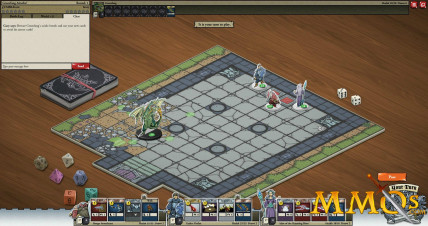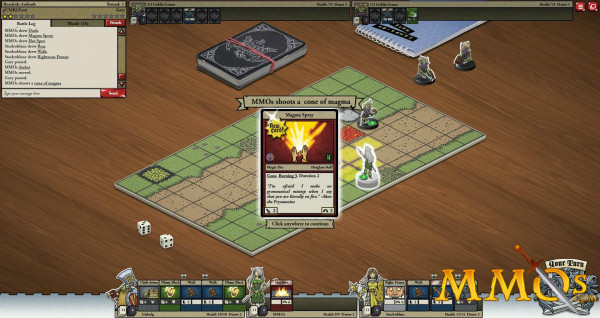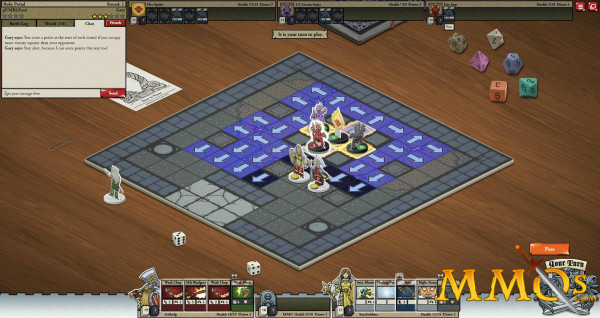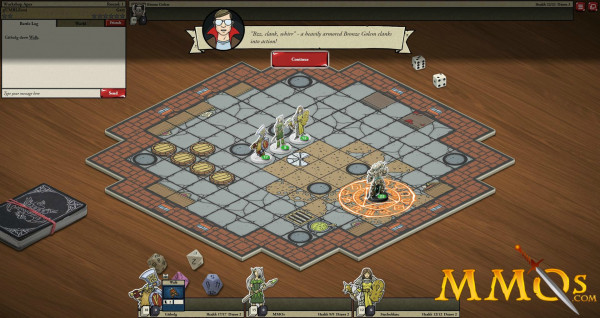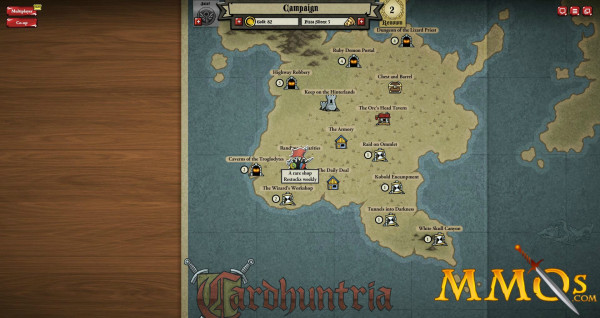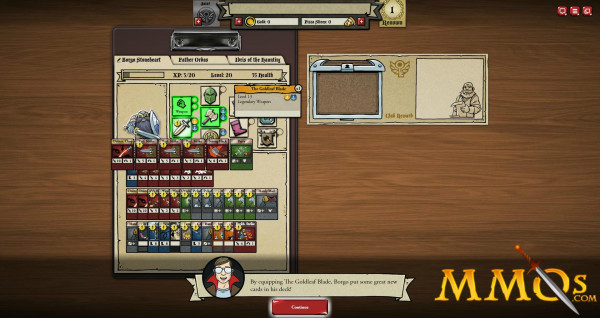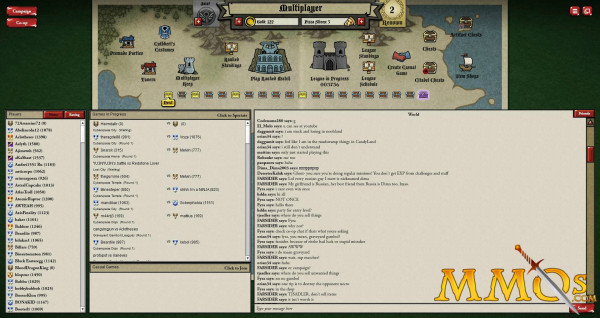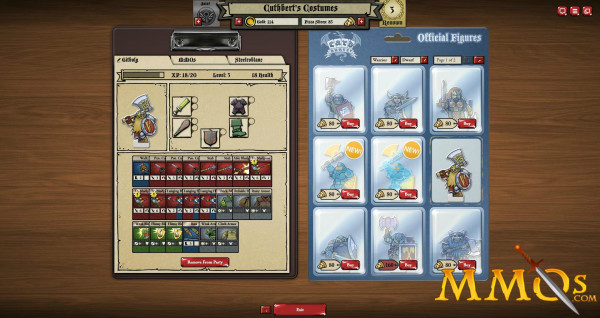Card Hunter
Card Hunter is a unique blend of TCG’s and tabletop gaming. Form a party and engage in tactical combat across a range of epic adventures as a dungeon master guides you through your journey.
| Publisher: Blue Manchu Playerbase: Medium Type: TCG Release Date: July 13, 2015 PvP: Duels Pros: +Single-player campaign. +Co-op play. +Huge library of cards. Cons: -Graphics may not appeal to some players. -Intermittent crashing. -Reliance on RNG. |
Card Hunter Overview
Card Hunter is an awesome blend of trading card games and traditional table-top games, reminiscent of Dungeons and Dragons adventures. Take on the role of a newcomer to Card Hunter, and learn the rules of the board game from an enthusiastic dungeon master in single-player mode. Three party members take to the field, across a wide variety of environments, to challenge monsters in their domain. Drawing abilities from a deck of cards, players tactically choose their actions. Defeat foes and obtain rare items to equip and artifacts to sell, as a massive campaign tests your abilities. Challenge the AI with a friend in a co-op adventure. Or, challenge other players in competitive duels to climb the seasonal rankings. There's a huge library of cards to collect and endless monsters to slay.
Card Hunter Key Features:
- Co-op Adventure - team up with a friend to slay monsters and collect loot together.
- Customizable Loadout - by equipping gear, weapons, and items you change the cards you bring to battle.
- Competitive Duels - challenge other players in casual or ranked games, and rise to the top of a seasonal league.
- Card Collector - a huge library of cards is available to collect and employ in adventures.
- Massive Campaign - learn the game’s mechanics in the grand adventure of the single-player game.
Card Hunter Screenshots
no images were found
Card Hunter Featured Video
Card Hunter Review
By, Sean Sullivan
Card Hunter is an engaging fusion of TCG’s and 1980’s nostalgia for basement D&D. It shines through its simplicity, and brings enough fresh systems to the table to distinguish itself. My recent tabletop endeavors inevitably ended in friends turning swords on each other, as mead fueled our violence. Luckily, the bridge-taped glasses dungeon master in Card Hunter is dedicated to the task, and with unwavering diligence enthusiastically guides treasure hunters on their adventure. Blue Manchu has delivered solid mechanics, charming aesthetics, and immersive gameplay in one of the most complete free-to-play titles available.
Back To Mom's Basement
Rather than play as an avatar in a fantasy world, you’re a newcomer to the board game Card Hunter, ready to slay dragons and collect loot from the depths of Melvin’s finished basement. Each adventure takes place on a board, placed on a faux hardwood floor, as your zealous dungeon master guides you through the game’s rules. While the board is one-dimensional it symbolizes a vast range of environments, from treacherous caves to furnished taverns—hindering movement and line of sight. Card Hunter doesn't illustrate the gaps in your imagination. The players fills in the details, and that adds to the game’s immersion, placing you at the table.
Your characters are static one-dimensional cutouts mounted on plastic stands. When moving they hop, as if the pizza-grease stained hand of the player has lifted them. Attached to each character is a deck of cards, hence the TCG element of the game, and the appropriate title. It’s unapologetically charming. Matches are divided into rounds where players and opponents take turns playing their character’s cards.
Dusting Off The Binder
Cards represent every possible action, and if you’re familiar with Dungeons and Dragons or other tabletop games, they won’t surprise you. They’re drawn in a variety of flavors and vary across the spectrum: movement, spells, melee attacks, defensive, heals, etc. You can play every card in your hand in a round, but you won’t always have the option. Some cards are activated passively, like defensive cards—only used when you’re under attack. Whereas other cards, such as spells, require you to be in range of another character. Each of the three classes—Warrior, Wizard, and Priest—have their own cards, indicative of their abilities. And at the end of your turn each character must only have two cards in their hand, otherwise cards must be discarded until only two are left.
Your choice of moves and the outcomes that result are heavily dependent on RNG. Whether or not an armor effectively defends an attack is based on the roll of the dice, while your possible moves are solely dependent on what cards you draw. I don’t have an issue with RNG as it is a tabletop game; spontaneity creates an engaging experience with every encounter. Randomness has its place, and no genres encourage it more than TCG’s and tabletop games.
Roleplaying
After completing two tutorial missions you’re prompted to create your own party, starting from Level 1. Every party needs a tank so you’re given a race-choice between a Dwarf, Human, or Elf Warrior; each offering their own advantages on the battlefield. While Elves are more mobile, Dwarves are more formidable. After choosing Dwarf I was prompted to choose a name, but the game’s suggestion “Gitbolg” was too appropriate to pass on. There is no character customization; everyone purchases the same starter figurines.
After crafting your character you’ll be assigned your first adventure. Missions are presented as flyers, ripped from the pages of a Card Hunter manual. Everything about the game does its best to simulate an after school gathering, and it's an aesthetic I was happily drunk on. After defeating the Kobold raiders in my first mission I was greeted by victory text, “The task now remains to track the miscreants back to their lair and put a stop to the attacks.” It’s writing taken seriously in a game like Pillars of Eternity, but comes across as infinitely charming and entertaining in Card Hunters.
For The Loot
What fun is adventuring without rewards? We don’t slay Kobold’s for glory. At the end of each battle you open a treasure chest, possibly containing rare loot. Cards in your deck are based on the items you have equipped. Weapons, armor, and trinkets offer their own cards when equipped, while miscellaneous loot can be exchanged for something more practical at the Armory. I sold my Amber Shards for 40 gold, more than enough to purchase a new axe. Equipping the mithril axe upgraded my simple attacks, and added formidable cards like Chop. Armor, items, and artifacts also add new abilities, allowing you to customize your loadout and find a tactical arrangement that suits you, making leveling easier.
Completing adventures allots experience, translating into levels and more health. Early on, levels will unlock additional equipment slots. At level 2 Gitbolg unlocked a Shield slot, adding defensive cards like block when slotted. And items do have level requirements, so you can’t buy an overpowered weapon and decimate every foe in your way.
Adventuring Together
When you’ve built up your arsenal of cards, and leveled sufficiently, you can take your skills to the arena and verse other players. Both casual and competitive matches exist, as well as seasonal ladders to test your strength. Like other card games, there is dependence on luck as well as skill, so its difficult to gauge exactly how much better one player is than another at higher tiers. But, if you’re not enthusiastic about flexing your muscles, you can tackle adventures with a friend in Co-op mode.
Gold Please
No one can be upset by Card Hunter’s cash shop when you make purchases with pizza, from Papa Manchu’s Pizza Menu. Pizza is Card Hunter’s premium currency, exchanged for premium items, gold, and memberships. 150 pizza slices are $4.99 while 690 slices is $19.99. Or, you can purchase bundled editions of the game with new figurines, chests, and membership. Pizza can be exchanged for costumes as well, new cosmetic figurines ranginging from Warhammer inspired warriors to meditating elves. They don’t provide any advantage, unless you count looking cool as the upper hand.
Or, spend your money on a membership. The Card Hunter Club rewards an extra item from every opened chest in both single-player and multiplayer. The items are at least as rare as can be expected from the adventures you’re completing. Memberships are for a limited time, and must be repurchased to keep reaping benefits. 80 pizza slices allots a one day membership while 1600 oozing cheesy bread slices is a six month membership. Nothing seemed pay-to-win as nearly everything can be earned in-game.
Final Verdict - Excellent
Card Hunter is an excellent melange of TCG’s and tabletop gaming, culminating in a whimsical aesthetic and adventure mode that is as silly as it is charming. Approaching the game with an open-mind reveals a world that caters to the imagination, and provides enough freedom for players to encounter a unique, immersive experience. Anyone who longs for the days of basement-dungeon-crawling will rekindle their love for adventure through Card Hunter.
Card Hunter Videos
Card Hunter Links
Card Hunter Official Site
Card Hunter Steam Page
Card Hunter Reddit
Card Hunter Wiki [Database/Guides]
Card Hunter System Requirements
Minimum Requirements:
Operating System: Windows XP 32 bit
CPU: Pentium 4 1.8GHz or Athlon XP 1700+
Video Card: GeForce 210 or Radeon X600 Series
RAM: 1 GB
Hard Disk Space: 1 GB
Recommended Requirements:
Operating System: Windows XP 32 bit
CPU: Celeron E1200 Dual-Core 1.6GHz or Athlon 64 X2 Dual Core 4000+
Video Card: GeForce GT 230 or Radeon HD 6550D
RAM: 2 GB
Hard Disk Space: 1 GB
Card Hunter is also a browser based game and will run smoothly on practically any PC. The game was tested and works well on Internet Explorer, Opera, Firefox and Chrome. Any modern web-browser should run the game smoothly.
Card Hunter Music & Soundtrack
Coming Soon...
Card Hunter Additional Information
Developer: Blue Manchu
Publisher: Blue Manchu
Designer(s): Jon Chey, Joe McDonagh, Dorian Hart
Artist(s): Ben Lee
Writer(s): Joe McDonagh
Engine: Adobe Flash
Release Date: September 12, 2013
Steam Release Date: July 13, 2015
Development History / Background:
Card Hunter was developed by Blue Manchu Games, formed by Jonathan Chey after he left Irrational Games. Work on Card Huter began in August 2010, but was not officially announced until July, 2011. The company began with only one full-time employee, Chey, but has since grown. The development team consists primarily of former Irrational Games and Looking Glass Studios employees, as well as consultants who had previously worked on Magic: The Gathering. Card Hunter is the first game developed by Blue Manchu Games, and was released for browsers only on September 12, 2013 with a subsequent Steam release on July 13, 2015.
